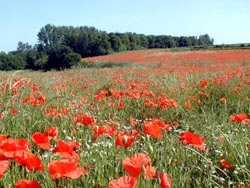 Tomorrow, November 11, is Veterans Day. Having spent the last several weeks studying World War I history in depth for the first time in my life, I have a new-found appreciation for the history of Veterans Day, originally known as Armistice Day, and the sacrifice of the soldiers which it honors.
Tomorrow, November 11, is Veterans Day. Having spent the last several weeks studying World War I history in depth for the first time in my life, I have a new-found appreciation for the history of Veterans Day, originally known as Armistice Day, and the sacrifice of the soldiers which it honors.World War I, also known as "The Great War" and "The War to End All Wars", literally changed the face of Europe, decimating old countries and creating new ones. It saw some of the deadliest battles recorded in history, with over 1.4 million soldiers dead and hundreds of thousands wounded. This was the first war to use modern technology: flamethrowers, barbed wire, machine guns, chemical weapons, aircraft, and tanks. Armies dug enormous trenches across the continent, losing hundreds of men for every few yards gained. Eventually, Europe reached a stalemate across the Western Front. Russia, an Allied country, faced a revolution at home as Czar Nicholas II (Anastasia's father) was overthrown by Lenin and the Bolsheviks. Russia was forced to withdraw from the war, abandoning the countries in the East to the Central Powers.
Americans watched the war anxiously, but the prevailing opinion was that this war was a European problem. Two important events helped galvanize Americans into action: the sinking of a civilian ocean liner, the Lusitania, by a German U-boat and the discovery of a covert plan by Germany to enlist Mexico's aid, in exchange for a large chunk of the American southwest after German victory. The tide of the war turned as General John J. Pershing and American Expeditionary Forces (AEF) arrived on the Western Front in 1917. The Allied Counteroffensive finally brought this war of horrors to a close at the eleventh hour of the eleventh day of the eleventh month: November 11, 1918.
In 1919, this solemn anniversary became unofficially known as "Armistice Day". Red poppies became popular as a memorial symbol after the publication of Canadian Lt. John McCrae's poem, In Flanders Fields, written on the battlefield of Ypres, in Flanders, Belgium:
In Flanders fields the poppies blow
Between the crosses row on row,
That mark our place; and in the sky
The larks, still bravely singing, fly
Scarce heard amid the guns below.
We are the Dead. Short days ago
We lived, felt dawn, saw sunset glow,
Loved and were loved, and now we lie
In Flanders fields.
Take up our quarrel with the foe:
To you from failing hands we throw
The torch; be yours to hold it high.
If ye break faith with us who die
We shall not sleep, though poppies grow
In Flanders fields.
Between the crosses row on row,
That mark our place; and in the sky
The larks, still bravely singing, fly
Scarce heard amid the guns below.
We are the Dead. Short days ago
We lived, felt dawn, saw sunset glow,
Loved and were loved, and now we lie
In Flanders fields.
Take up our quarrel with the foe:
To you from failing hands we throw
The torch; be yours to hold it high.
If ye break faith with us who die
We shall not sleep, though poppies grow
In Flanders fields.
Here's more on America's few surviving WWI Veterans.
Tomorrow, take a moment... and remember.

1 comment:
Thank you for visiting my blog! Feel free to come again!
In Flanders Field, Bivouac of the Dead, and High Flight are always a part of my Arlington National Cemetery and Gettysburg National Cemetery tours. High Flight is chisled on the back of the challenger Memorial Stone and Bivouac of the dead can be found on plaques in parts of Arlington and Gettysburg.
The Memorial Ampitheatre at Arlington is a place where I talk about Pericles' Funeral Oration.
It's interesting that you agree with my assessment of the plight of poetry in modern American education.
You're the reason why homeschooled students are doing far better than the public and private school counterparts!
It's evident that someone has blundered!
Oh. I live in Alexandria, and we could have crossed paths at someplace where you worked!
Post a Comment